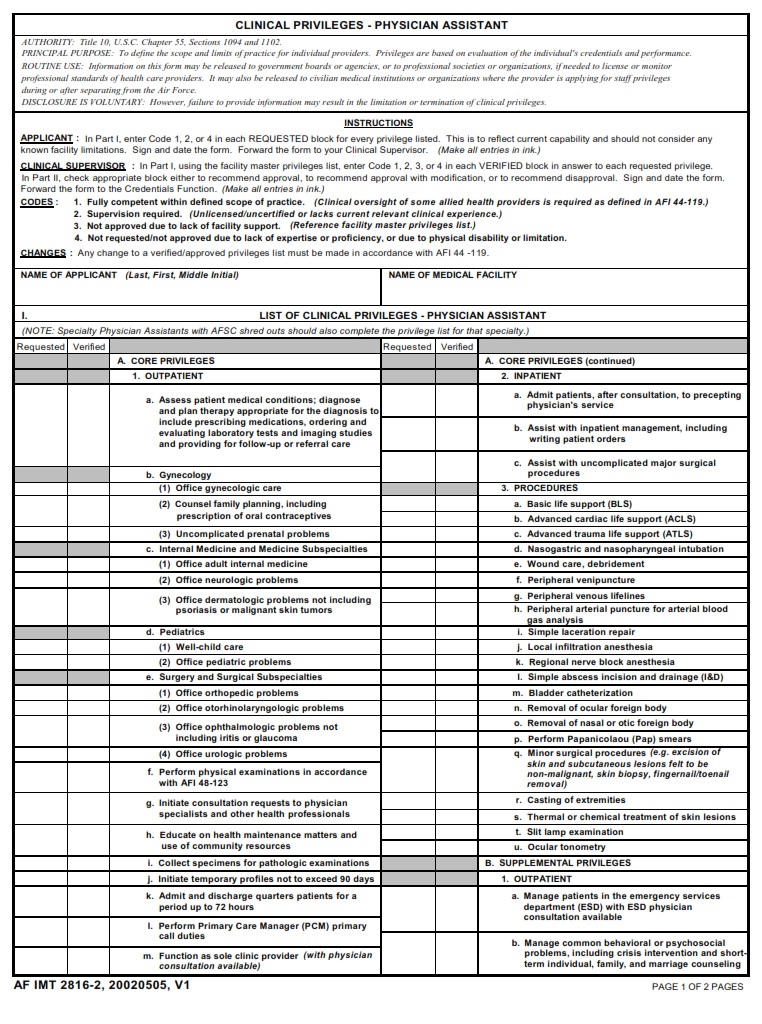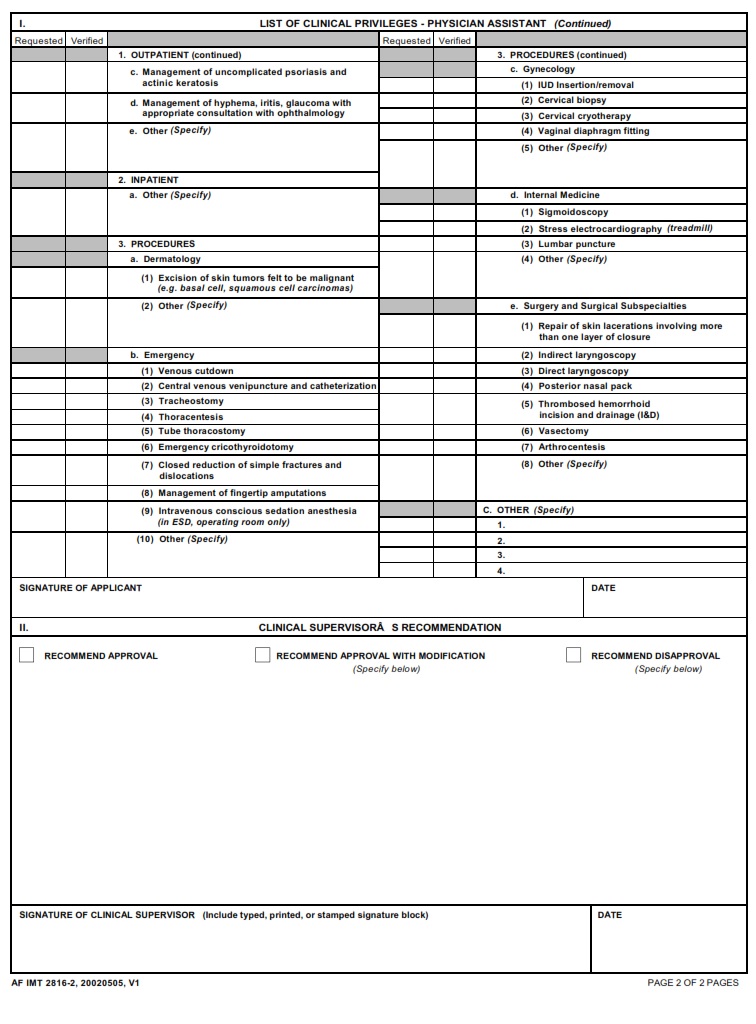AF-FORMS.COM – AF Form 2816-2 – Clinical Privileges – Physician Assistant – Unlocking the potential of healthcare providers, the AF Form 2816-2 – Clinical Privileges Physician Assistant is a crucial document that not only empowers physician assistants but also ensures the delivery of high-quality patient care within military medical facilities. In this article, we delve into the importance and impact of this form on the role and responsibilities of physician assistants in providing essential medical services to our armed forces. From its significance in upholding clinical standards to its influence on shaping the future of military healthcare, we explore how this form stands as a cornerstone in optimizing patient outcomes and professional development for physician assistants.
As frontline advocates for comprehensive healthcare delivery, physician assistants play an integral role in our military’s medical landscape. The AF Form 2816-2 – Clinical Privileges Physician Assistant emerges as a pivotal tool that not only recognizes their expertise but also establishes clear guidelines for their clinical practice within military healthcare settings. This article embarks on an insightful journey into understanding how this form serves as a catalyst for elevating the scope of practice for physician assistants, fostering collaborative care teams, and ultimately enhancing the overall health and wellness of our service members. Uncover with us the significance and far-reaching implications of this document in shaping modern military medicine.
Download AF Form 2816-2 – Clinical Privileges – Physician Assistant
| Form Number | AF Form 2816-2 |
| Form Title | Clinical Privileges – Physician Assistant |
| Edition Date | 5/5/2002 |
| File Size | 148 KB |
AF-Form-2816-2-Clinical-Privileges-–-Physician-Assistant.pdf (30 downloads )
What is an AF Form 2816-2?
The AF Form 2816-2, also known as the Clinical Privileges – Physician Assistant form, serves as a critical document in the United States Air Force medical system. This form is specifically designed to outline the clinical privileges granted to physician assistants within Air Force medical facilities. It details the specific duties, procedures, and treatments that a physician assistant is authorized to perform within their scope of practice.
For military personnel and healthcare professionals alike, understanding the significance of the AF Form 2816-2 is essential. By delineating the responsibilities and limitations of physician assistants in military healthcare settings, this form plays a crucial role in ensuring high-quality patient care while maintaining regulatory compliance. Moreover, it underscores the unique contributions that physician assistants make to support their colleagues and serve the needs of military service members and their families.
This obscure yet pivotal document offers valuable insight into how clinical privileges are governed within the U.S. Air Force healthcare system. It represents not only an administrative tool but also a symbol of trust and responsibility placed upon physician assistants who play a vital role in providing quality care to those who serve our country. Understanding its implications sheds light on the intricate dynamics of healthcare delivery within military institutions.
Where Can I Find an AF Form 2816-2?
If you’re in search of an AF Form 2816-2, the most reliable place to find it would be through official military channels. This form, also known as the Clinical Privileges Physician Assistant form, is a critical document used by physician assistants in the Air Force to request clinical privileges. You can typically obtain this form from your unit’s administrative office or directly from the medical facility where you are assigned.
For military personnel seeking this form, it’s crucial to follow proper protocol and procedures when obtaining and submitting it. The AF Form 2816-2 plays a significant role in outlining the scope of practice for physician assistants within the Air Force and ensures that they are fully authorized to perform specific medical tasks within their capabilities. Therefore, accessing this form through official channels is imperative for compliance with military regulations and maintaining patient safety.
Overall, finding an AF Form 2816-2 requires navigating official military avenues, as it is a vital tool for ensuring proper clinical privileges for physician assistants within the Air Force. Engaging with administrative offices or medical facilities directly will help individuals acquire this essential document and navigate its related processes efficiently.
AF Form 2816-2 – Clinical Privileges – Physician Assistant
AF Form 2816-2, also known as the Clinical Privileges Physician Assistant form, plays a critical role in ensuring that physician assistants (PAs) are authorized to perform specific clinical duties within the Military Health System. This form serves as a formal documentation of the PA’s credentials, qualifications, and clinical privileges, providing transparency and accountability in the delivery of healthcare services to military personnel and their families. It emphasizes the importance of upholding high standards of care and competency while giving PAs the autonomy to contribute their valuable skills and expertise to patient care.
When filling out AF Form 2816-2, it becomes apparent that this process is more than just paperwork—it signifies a commitment to excellence in patient care. By delineating specific clinical privileges for PAs, this form not only ensures that they can practice within their scope of expertise but also fosters collaboration with other healthcare professionals. It empowers PAs to actively participate in interdisciplinary teams, contributing to holistic patient management and promoting efficient healthcare delivery within military healthcare facilities.
In conclusion, AF Form 2816-2 serves as a testament to the professionalism and dedication of physician assistants in delivering quality healthcare services within the military setting. By recognizing their unique skills and granting them appropriate clinical privileges, this form underscores the pivotal role PAs play in ensuring optimal patient outcomes while upholding rigorous standards of care within military healthcare facilities.

